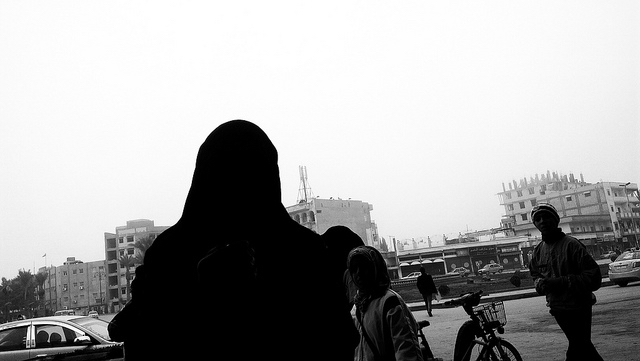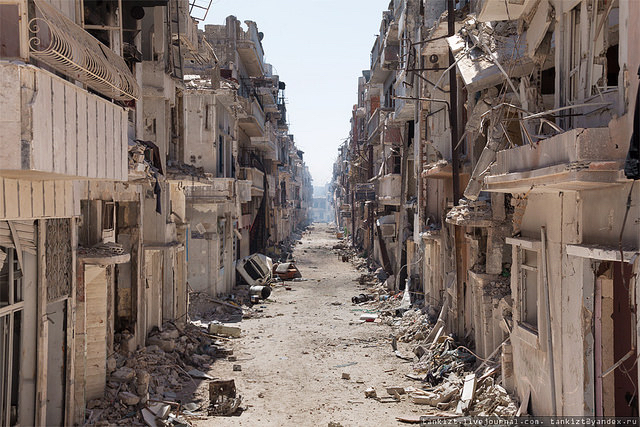AIN Al-ISSA – In a dank and dingy room in a camp for internally displaced persons in northern Syria, a striking woman wearing mascara and a long black chador steps through a broken door frame.
“I don’t believe in the jihad,” she says, in perfect English, while lighting a cigarette. “I do not believe in any of these things … I just married the man that I loved.”
Aisha Abdul Gani is the 30-year-old Syrian wife of a Moroccan man who used to fight with the so-called Islamic State in the city of Raqqa. These days she is being detained with 15 other women, all married to suspected ISIS fighters, in a special section of the Ain al-Issa camp north of Raqqa city.
Crammed into a small and isolated concrete building comprising five connected rooms, the black-clad women are separated from other residents of the camp by a large wall. From the outside, their building almost looks gleeful, its walls painted a sky blue. Inside, scribbles and graffiti cover the white walls, and most of the small windows are sealed with squared metal grills.
There are women living here who come from Germany, Morocco, Tunisia, Russia and Syria. Some are waiting for the release of their husbands who are being detained by the Syrian Democratic Forces in prisons outside the camp. Others are widows who are waiting for approval to cross into SDF-held parts of northern Syria.
Many of them fled the embattled city of Raqqa with the start of the SDF campaign against ISIS in June. They ended up in Ain al-Issa after surrendering to the Kurdish-led force or after they were arrested by the group on the outskirts of the city.
Most of the women say they would not return to living under ISIS but hope to go back to their homes one day. Some refuse the idea that the so-called caliphate has crumbled and say they would return to the extremist group if they could.
A Romance in Raqqa
Pointing to her black chador, Abdul Gani says that she never used to dress like this.
“I used to wear a normal headscarf before, but in Raqqa, you were forced to dress like this,” she said, adding that when she leaves the camp, she will again dress as she used to.
Aisha, who hails from the city of Homs, says she ended up clad in black in ISIS’s former de facto capital after years of trying to escape the war in Syria.
Her first husband was shot to death by government forces during the early protests in Homs province in 2011. For four years after his death, she lived in Damascus, where she taught English in a school. In 2015, she tried to flee to Turkey but was captured by ISIS in Raqqa before she could make it to the border. She said the militant group forbade her from crossing into Turkey because she was a Muslim who belonged in the so-called Islamic State.
It was during her first week living in Raqqa that she met her second husband.
The Moroccan had come to Syria to wage “jihad” against the Syrian government, she said. His cousin had already been living in Raqqa and had encouraged him to come to the militant stronghold by sending him videos of civilians being tortured by loyalists of Syrian President Bashar al-Assad.
“He wanted to liberate Syria from this criminal, but when he came to Raqqa, he saw the other side of the same coin: cruel tortures, barbaric killing, arbitrary decapitations,” she said.
The two would eventually get married and grow even more disenchanted with the militant group. They thought about escaping from Raqqa by paying a smuggler, but they could not afford the fees.
The couple found a way out in June, when the SDF launched a wide-scale offensive against ISIS in Raqqa. The two surrendered to the Kurdish-led force, which detained her husband in a prison near Kobane and held her in the Ain al-Issa camp until further notice.
“I didn’t do anything wrong. I married the man I loved,” she said.
‘I Came for the Jihad’
Khadija al-Humri came to Raqqa by choice.
“I came for the Jihad, for Sharia and the Islamic State,” the 29-year-old Tunisian woman said, roughly four years after leaving her hometown along with her first husband.
“I really believed that there was a state where we could live like the Prophet.”
But Raqqa was not all it was made out to be. Khadija’s first husband was killed in battles with the Free Syrian Army, and the widow was transferred to a dormitory were unmarried women wait to be selected by ISIS fighters.
“It was horrible … I had to get married if I wanted to leave that place,” she said.
Her disenchantment would be expounded by the time she remarried. She described rampant drug abuse and a thriving sex trade in a city where people were killed for no reason. She recalled clashes between ISIS fighters and described a group of French ISIS brides who used to abuse Captagon, an amphetamine-based drug nicknamed the “Jihadi Pill.”
“My second husband who was an ISIS fighter opened my eyes,” she said. “He told me that the [Islamic State] did not exist. We had made a big mistake.”
The Female Fighter and the ISIS Bride
The sound of the muezzin from a nearby mosque marks the hour of prayer. Agiar, a slim 22-year-old girl from Hama, calls the women in to pray.
She is notorious among other women in the camp. They say she was a female ISIS fighter who used to teach tae kwon do to young children in an ISIS training camp. Today, she is one of the only women who are eager to return to the Islamic State.
“The Islamic State is not over yet,” she says, flipping through the pages of the Koran in her black Abaya.
“I want to go back to Raqqa or leave for Russia,” she says.
She refuses to say anymore.
Sitting beside her in a corner, Seline, a 23-year-old woman from Aleppo, cradles her baby in her arm.
“I do not know what will happen in the future. I have no hope,” she said.
“My family is in Istanbul, my husband’s family is in Malaysia. I would like to contact them to ask them to adopt my children. It is the best solution for them, so that they can have a life, different from mine.”
“My father sold me to an Islamic militant, who came to Syria from Malaysia,” she explained. She said that she tried to persuade her husband to leave ISIS, and they both tried to escape, but her husband was arrested by the SDF during the Raqqa military offensive before they could get away.
This article originally appeared on Syria Deeply. You can find the original here. For important news about the war in Syria, you can sign up to the Syria Deeply email list. Photograph courtesy of Beshr Abdulhadi. Published under a Creative Commons license.





